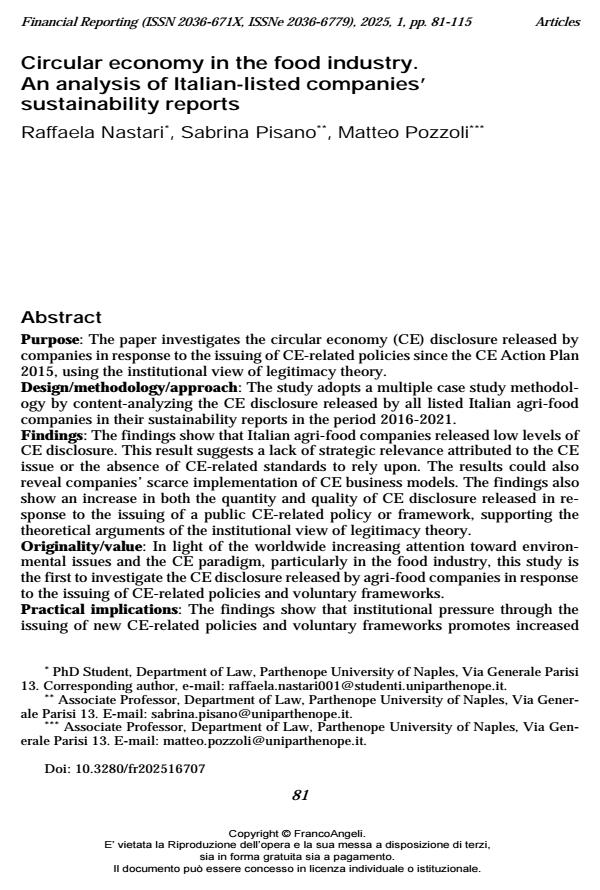Circular economy in the food industry. An analysis of Italian-listed companies’ sustainability reports
Journal title FINANCIAL REPORTING
Author/s Raffaela Nastari, Sabrina Pisano, Matteo Pozzoli
Publishing Year 2025 Issue 2025/1
Language English Pages 35 P. 81-115 File size 265 KB
DOI 10.3280/fr202516707
DOI is like a bar code for intellectual property: to have more infomation
click here
Below, you can see the article first page
If you want to buy this article in PDF format, you can do it, following the instructions to buy download credits

FrancoAngeli is member of Publishers International Linking Association, Inc (PILA), a not-for-profit association which run the CrossRef service enabling links to and from online scholarly content.
Purpose: The paper investigates the circular economy (CE) disclosure released by companies in response to the issuing of CE-related policies since the CE Action Plan 2015, using the institutional view of legitimacy theory. Design/methodology/approach: The study adopts a multiple case study methodology by content-analyzing the CE disclosure released by all listed Italian agri-food companies in their sustainability reports in the period 2016-2021. Findings: The findings show that Italian agri-food companies released low levels of CE disclosure. This result suggests a lack of strategic relevance attributed to the CE issue or the absence of CE-related standards to rely upon. The results could also reveal companies’ scarce implementation of CE business models. The findings also show an increase in both the quantity and quality of CE disclosure released in response to the issuing of a public CE-related policy or framework, supporting the theoretical arguments of the institutional view of legitimacy theory. Originality/value: In light of the worldwide increasing attention toward environmental issues and the CE paradigm, particularly in the food industry, this study is the first to investigate the CE disclosure released by agri-food companies in response to the issuing of CE-related policies and voluntary frameworks. Practical implications: The findings show that institutional pressure through the issuing of new CE-related policies and voluntary frameworks promotes increased CE disclosure by companies, suggesting that implementing both Directive 2022/2464/EU and the EFRAG standards would further encourage the release of CE disclosure.
Keywords: SDG, environmental disclosure, CE Action Plan, Directive 2014/95/EU, agri-food companies, legitimacy theory
Jel codes: Q01, Q18, M41, L66, O13
Raffaela Nastari, Sabrina Pisano, Matteo Pozzoli, Circular economy in the food industry. An analysis of Italian-listed companies’ sustainability reports in "FINANCIAL REPORTING" 1/2025, pp 81-115, DOI: 10.3280/fr202516707